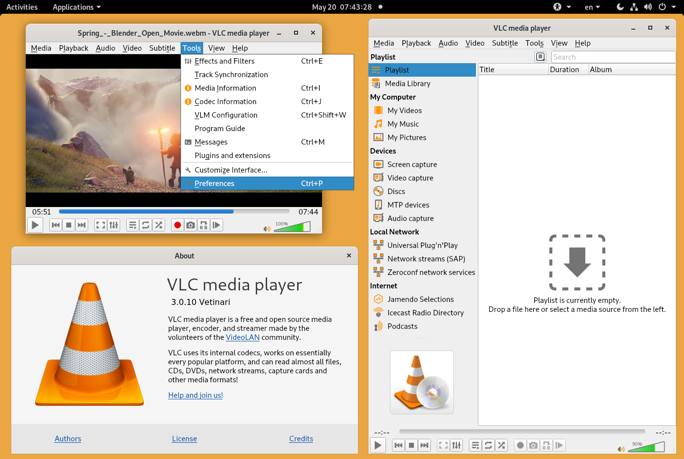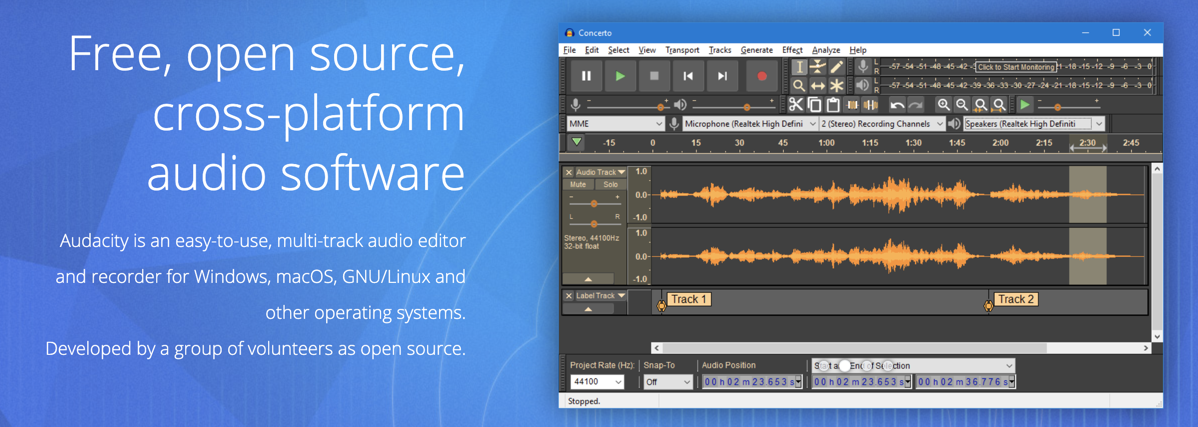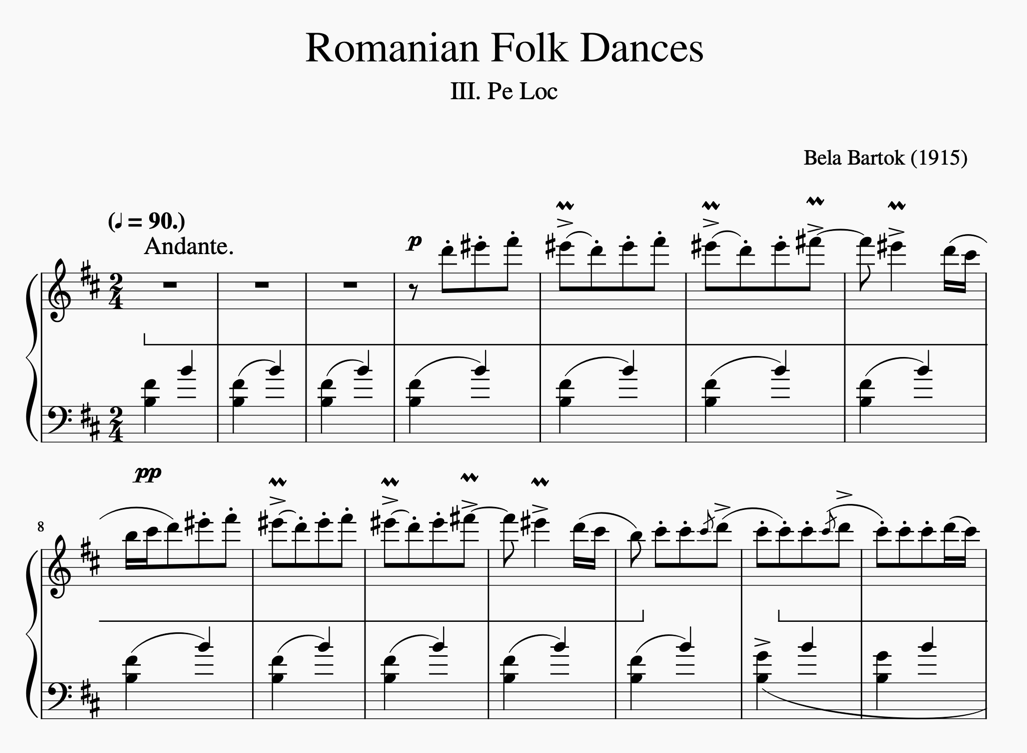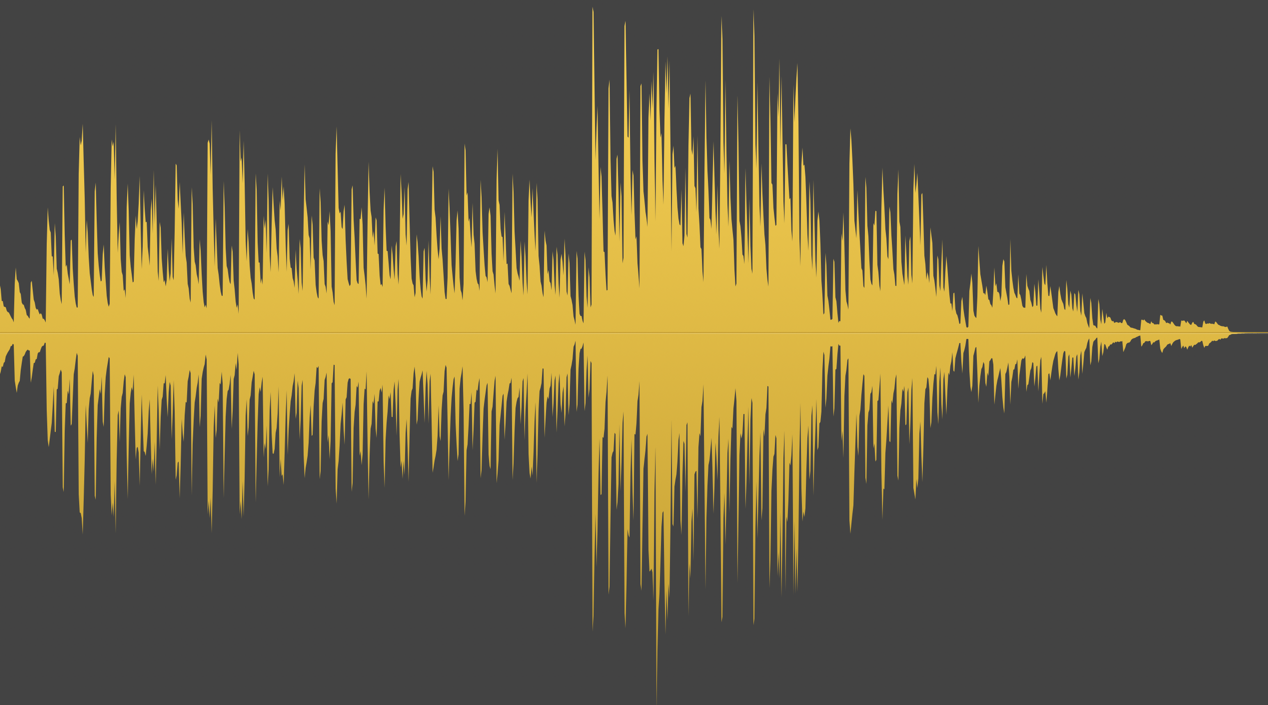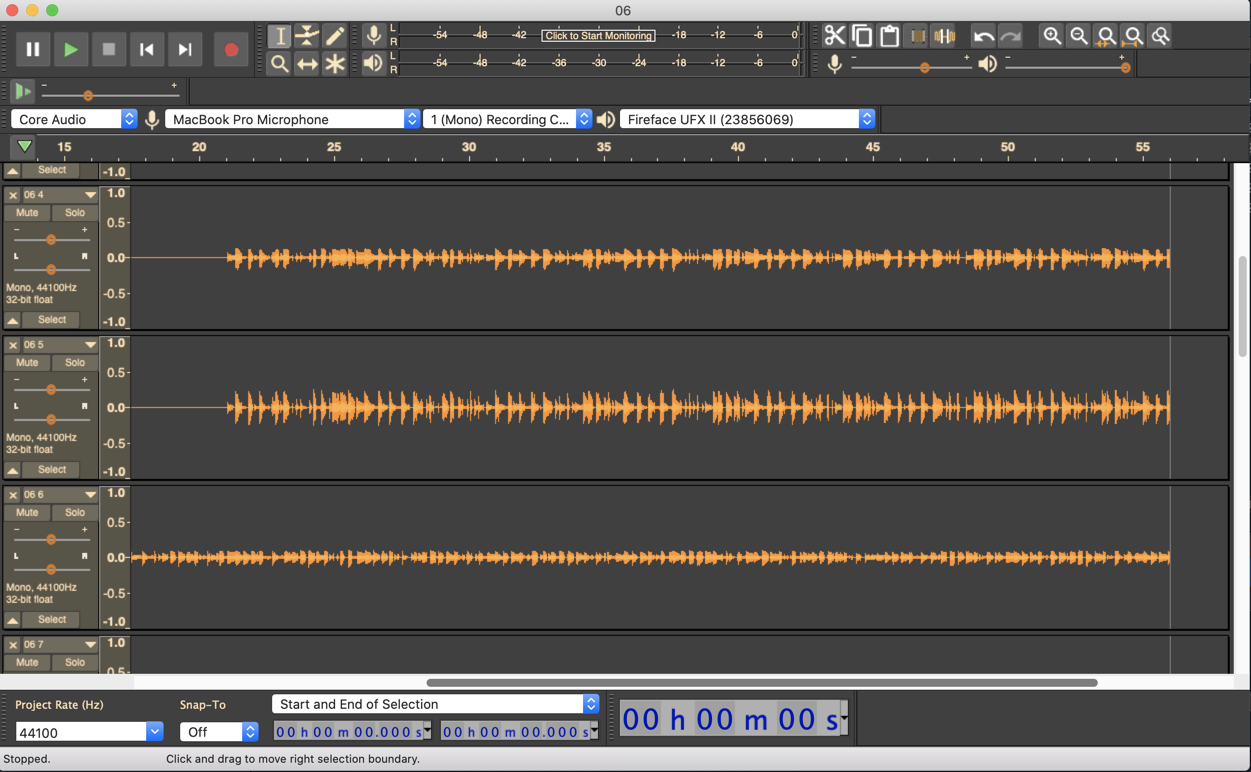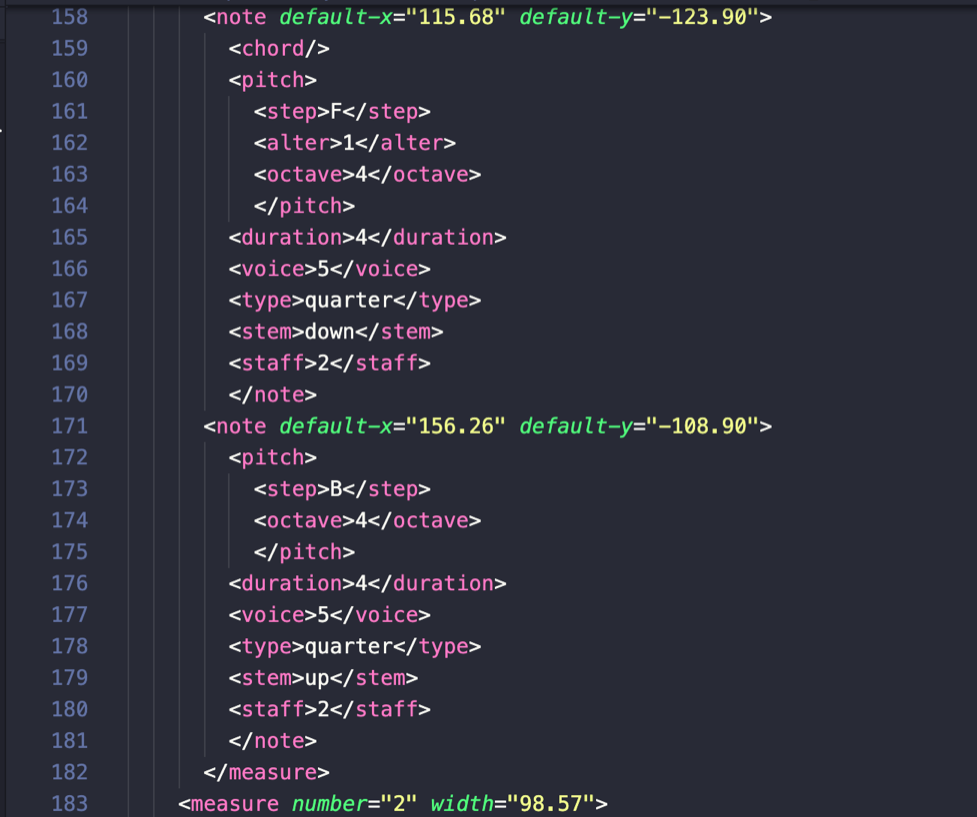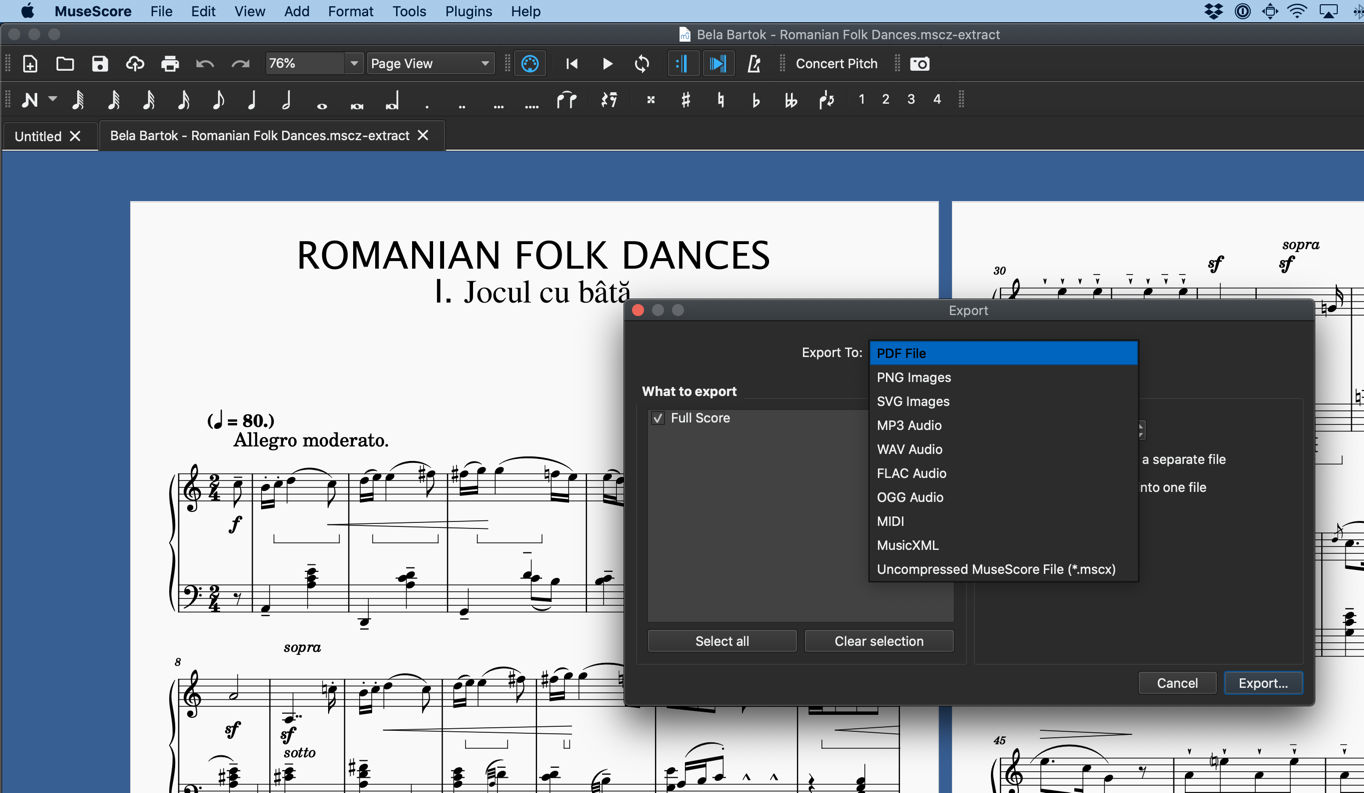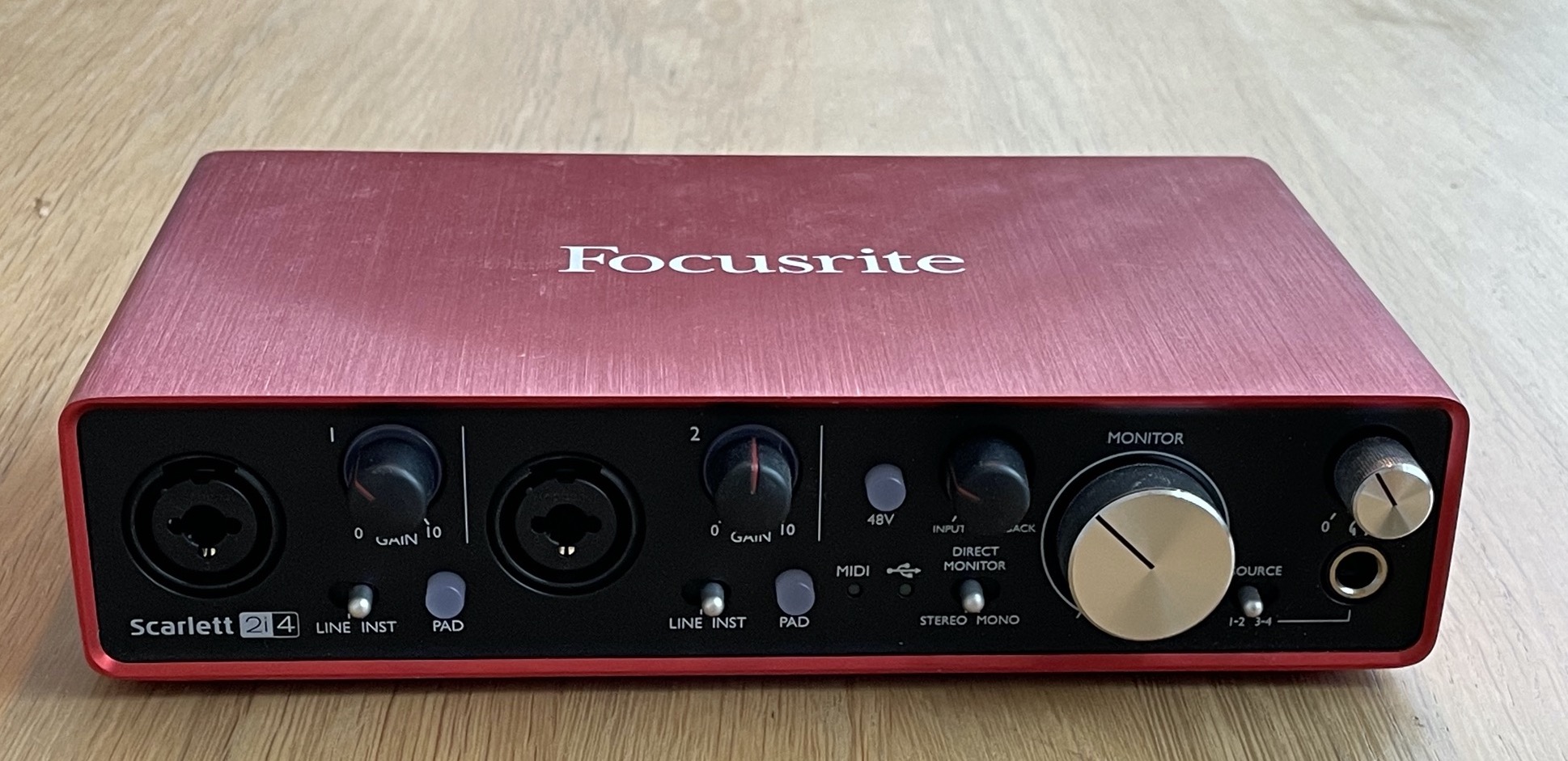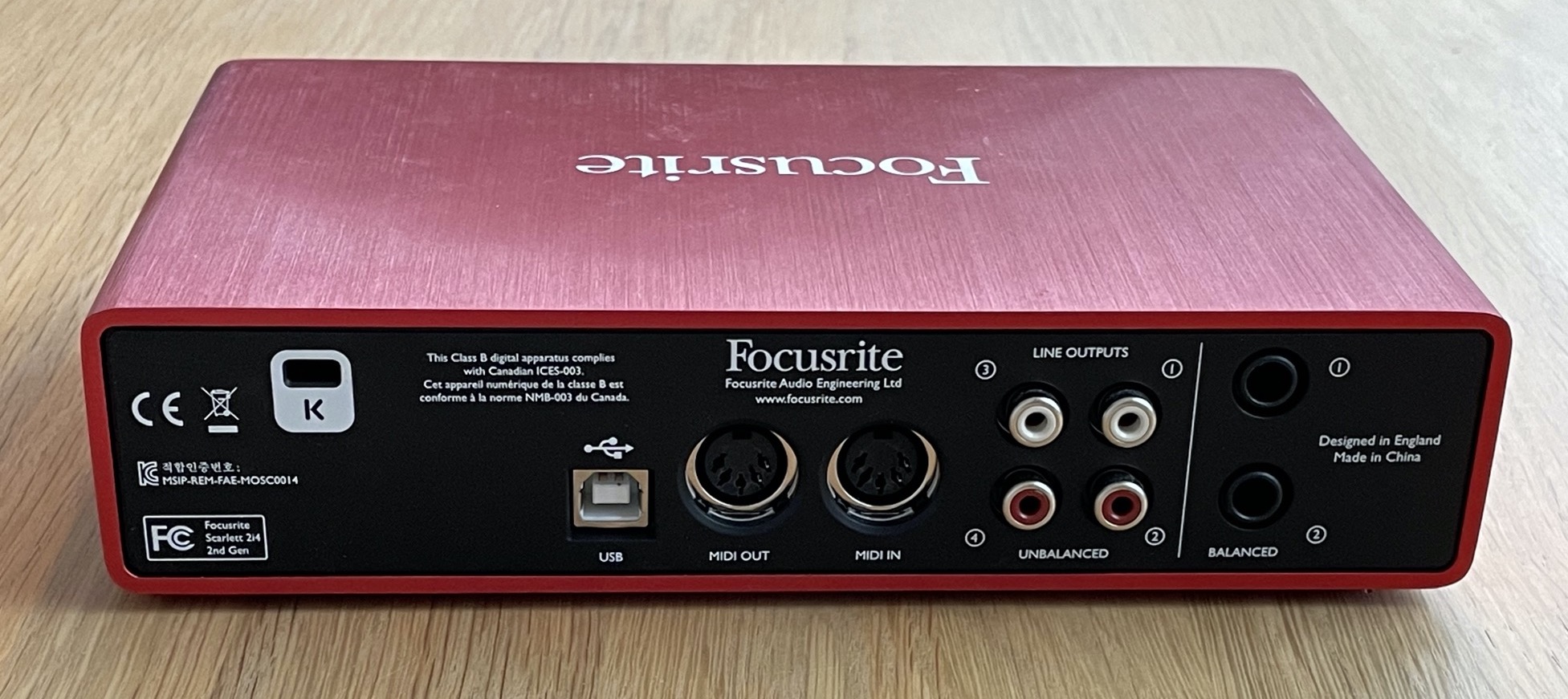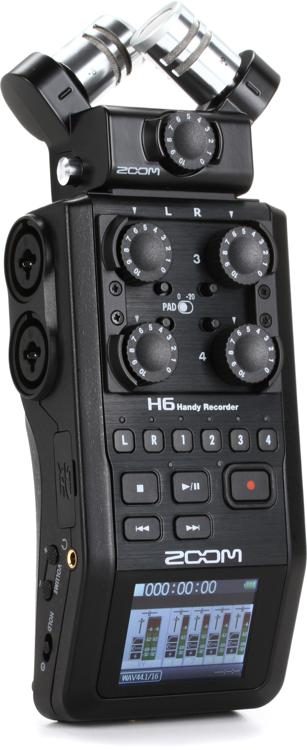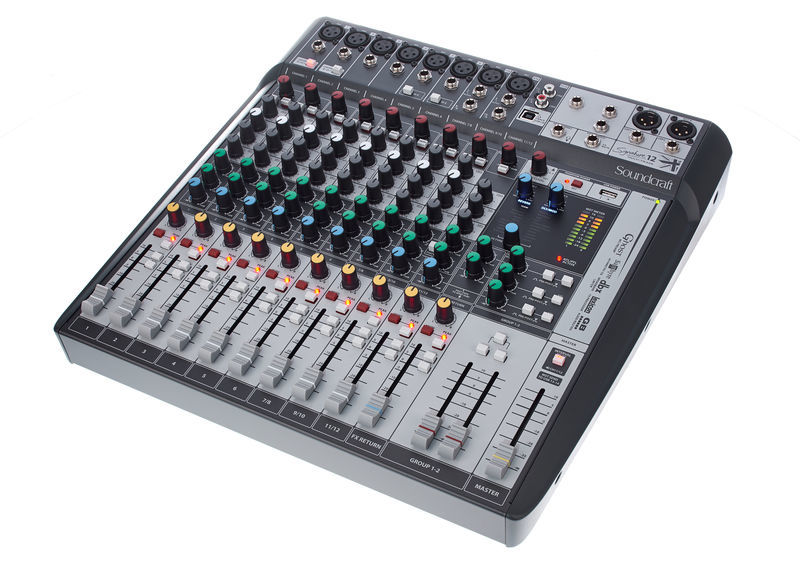Subsections of Computer Audio Basics
Challenge
Open and play the following files on your device.
You can also download them as one zip file here.
How to?
VLC media player
VLC plays (almost) all video and audio files.
VLC is a free and open source cross-platform multimedia player and framework that plays most multimedia files as well as DVDs, Audio CDs, VCDs, and various streaming protocols.
Audacity
Audacity is a Free, open source, cross-platform audio software. the accent here is on editing.
Open-source software (OSS) is a type of computer software in which source code is released under a license in which the copyright holder grants users the rights to use, study, change, and distribute the software to anyone and for any purpose. Open-source software may be developed in a collaborative public manner. Open-source software is a prominent example of open collaboration. wiki
Music File Formats
The first 4 files can all be opened with VLC and contain the same piece exported under different formats from the sheet editor Musescore.
File 1-3: Wav, mp3, Flac files
Thiose can be opened with VLC and Audacity. For a deep dive MP3, AAC, WAV, FLAC: all the audio file formats explained
File 4: MIDI
File 4 can be opened and played with VLC.
MIDI (Musical Instrument Digital Interface) is a standard protocol for the interchange of musical information between musical instruments, synthesizers and computers. It defines codes for musical notes as well as button, dial and pedal adjustments, and MIDI control messages can orchestrate a series of synthesizers, each playing a part of the musical score. MIDI Version 1.0 was introduced in 1983.
MIDI 2.0 specifications have been released.
File 5: Music xml
Format
MusicXML was designed from the ground up for sharing sheet music files between applications, and for archiving sheet music files for use in the future. You can count on MusicXML files being readable and usable by a wide range of music notation applications, now and in the future. MusicXML complements the native file formats used by Finale and other programs, which are designed for rapid, interactive use.
Just as MP3 files have become synonymous with sharing recorded music, MusicXML files have become the standard for sharing interactive sheet music. With MusicXML you can create music in one program and share your results – back and forth – with people using other programs. Today more than 250 applications include MusicXML support.
How to import and export music xml
All the major sheet editors can read and import music xml (Sibelius, Finale, Dorico, Musescore).
VLC and Audacity can’t handle these but there is a a free service: https://www.soundslice.com/musicxml-viewer/
And the result is “resizable”. Give it a try by changing the size of your browser window.
Nr 6, a surprise!
Only(?) Audacity can manage mogg files.
Pleas take a look at how to open a file with a specific software on PC and Mac by right-clicking and using Open With. And for the (proud) Mac owners do yourself a favor and activate show file extension.
Music XML
Autopsy
Markup language
<?xml version="1.0" encoding="UTF-8"?>
<!DOCTYPE score-partwise PUBLIC "-//Recordare//DTD MusicXML 3.1 Partwise//EN" "http://www.musicxml.org/dtds/partwise.dtd">
<score-partwise version="3.1">
<identification>
<encoding>
<software>MuseScore 3.5.2</software>
<encoding-date>2020-12-02</encoding-date>
<supports element="accidental" type="yes"/>
<supports element="beam" type="yes"/>
<supports element="print" attribute="new-page" type="yes" value="yes"/>
<supports element="print" attribute="new-system" type="yes" value="yes"/>
<supports element="stem" type="yes"/>
</encoding>
<source>http://musescore.com/user/30432972/scores/5434890</source>
</identification>
<defaults>
<scaling>
<millimeters>7.05556</millimeters>
<tenths>40</tenths>
</scaling>
<page-layout>
<page-height>1683.36</page-height>
<page-width>1190.88</page-width>
<page-margins type="even">
<left-margin>56.6929</left-margin>
<right-margin>56.6929</right-margin>
<top-margin>56.6929</top-margin>
<bottom-margin>113.386</bottom-margin>
</page-margins>
<page-margins type="odd">
<left-margin>56.6929</left-margin>
<right-margin>56.6929</right-margin>
<top-margin>56.6929</top-margin>
<bottom-margin>113.386</bottom-margin>
</page-margins>
</page-layout>
<word-font font-family="FreeSerif" font-size="10"/>
<lyric-font font-family="FreeSerif" font-size="11"/>
</defaults>
<credit page="1">
<credit-type>composer</credit-type>
<credit-words default-x="1134.19" default-y="1474.54" justify="right" valign="bottom" font-size="12">Bela Bartok (1915)</credit-words>
</credit>
<credit page="1">
<credit-type>subtitle</credit-type>
<credit-words default-x="595.44" default-y="1569.97" justify="center" valign="top" font-size="14">III. Pe Loc</credit-words>
</credit>
<credit page="1">
<credit-type>title</credit-type>
<credit-words default-x="595.44" default-y="1626.67" justify="center" valign="top" font-size="24">Romanian Folk Dances</credit-words>
</credit>
<part-list>
<score-part id="P1">
<part-name>Piano</part-name>
<part-abbreviation>Pno.</part-abbreviation>
<score-instrument id="P1-I1">
<instrument-name>Piano</instrument-name>
</score-instrument>
<midi-device id="P1-I1" port="1"></midi-device>
<midi-instrument id="P1-I1">
<midi-channel>1</midi-channel>
<midi-program>1</midi-program>
<volume>100</volume>
<pan>0</pan>
</midi-instrument>
</score-part>
</part-list>
<part id="P1">
<measure number="1" width="198.45">
<print>
<system-layout>
<system-margins>
<left-margin>21.00</left-margin>
<right-margin>0.00</right-margin>
</system-margins>
<top-system-distance>269.19</top-system-distance>
</system-layout>
<staff-layout number="2">
<staff-distance>108.90</staff-distance>
</staff-layout>
</print>
<attributes>
<divisions>4</divisions>
<key>
<fifths>2</fifths>
</key>
<time>
<beats>2</beats>
<beat-type>4</beat-type>
</time>
<staves>2</staves>
<clef number="1">
<sign>G</sign>
<line>2</line>
</clef>
<clef number="2">
<sign>F</sign>
<line>4</line>
</clef>
</attributes>
<direction placement="above">
<direction-type>
<words default-x="-39.76" default-y="29.36" relative-y="20.00" font-weight="bold" font-size="13">(</words>
</direction-type>
<direction-type>
<metronome parentheses="no" default-x="-39.76" default-y="29.36" relative-y="20.00">
<beat-unit>quarter</beat-unit>
<per-minute>90</per-minute>
</metronome>
</direction-type>
<direction-type>
<words default-x="-39.76" default-y="29.36" relative-y="20.00" font-weight="bold" font-size="13">.)</words>
</direction-type>
<staff>1</staff>
<sound tempo="90"/>
</direction>
<direction placement="above">
<direction-type>
<words relative-y="40.00" font-size="14">Andante.</words>
</direction-type>
<staff>1</staff>
</direction>
<direction placement="below">
<direction-type>
<pedal type="start" line="yes" default-y="-80.00"/>
</direction-type>
<staff>1</staff>
</direction>
<note>
<rest measure="yes"/>
<duration>8</duration>
<voice>1</voice>
<staff>1</staff>
</note>
<backup>
<duration>8</duration>
</backup>
<direction placement="below">
<direction-type>
<dynamics default-x="3.29" default-y="-40.00" relative-y="-40.00">
<pp/>
</dynamics>
</direction-type>
<staff>2</staff>
<sound dynamics="36.67"/>
</direction>
<note default-x="115.68" default-y="-143.90">
<pitch>
<step>B</step>
<octave>3</octave>
</pitch>
<duration>4</duration>
<voice>5</voice>
<type>quarter</type>
<stem>down</stem>
<staff>2</staff>
</note>
<note default-x="115.68" default-y="-123.90">
<chord/>
<pitch>
<step>F</step>
<alter>1</alter>
<octave>4</octave>
</pitch>
<duration>4</duration>
<voice>5</voice>
<type>quarter</type>
<stem>down</stem>
<staff>2</staff>
</note>
<note default-x="156.26" default-y="-108.90">
<pitch>
<step>B</step>
<octave>4</octave>
</pitch>
<duration>4</duration>
<voice>5</voice>
<type>quarter</type>
<stem>up</stem>
<staff>2</staff>
</note>
</measure>
<measure number="2" width="98.57">
<note>
<rest measure="yes"/>
<duration>8</duration>
<voice>1</voice>
<staff>1</staff>
</note>
<backup>
<duration>8</duration>
</backup>
<note default-x="15.80" default-y="-143.90">
<pitch>
<step>B</step>
<octave>3</octave>
</pitch>
<duration>4</duration>
<voice>5</voice>
<type>quarter</type>
<stem>down</stem>
<staff>2</staff>
<notations>
<slur type="start" placement="above" number="1"/>
</notations>
</note>
<note default-x="15.80" default-y="-123.90">
<chord/>
<pitch>
<step>F</step>
<alter>1</alter>
<octave>4</octave>
</pitch>
<duration>4</duration>
<voice>5</voice>
<type>quarter</type>
<stem>down</stem>
<staff>2</staff>
</note>
<note default-x="56.38" default-y="-108.90">
<pitch>
<step>B</step>
<octave>4</octave>
</pitch>
<duration>4</duration>
<voice>5</voice>
<type>quarter</type>
<stem>up</stem>
<staff>2</staff>
<notations>
<slur type="stop" number="1"/>
</notations>
</note>
</measure>
<measure number="3" width="98.57">
<note>
<rest measure="yes"/>
<duration>8</duration>
<voice>1</voice>
<staff>1</staff>
</note>
<backup>
<duration>8</duration>
</backup>
<note default-x="15.80" default-y="-143.90">
<pitch>
<step>B</step>
<octave>3</octave>
</pitch>
<duration>4</duration>
<voice>5</voice>
<type>quarter</type>
<stem>down</stem>
<staff>2</staff>
<notations>
<slur type="start" placement="above" number="1"/>
</notations>
</note>
<note default-x="15.80" default-y="-123.90">
<chord/>
<pitch>
<step>F</step>
<alter>1</alter>
<octave>4</octave>
</pitch>
<duration>4</duration>
<voice>5</voice>
<type>quarter</type>
<stem>down</stem>
<staff>2</staff>
</note>
<note default-x="56.38" default-y="-108.90">
<pitch>
<step>B</step>
<octave>4</octave>
</pitch>
<duration>4</duration>
<voice>5</voice>
<type>quarter</type>
<stem>up</stem>
<staff>2</staff>
<notations>
<slur type="stop" number="1"/>
</notations>
</note>
</measure>
<measure number="4" width="163.01">
<direction placement="above">
<direction-type>
<dynamics default-x="5.06" relative-y="30.00">
<p/>
</dynamics>
</direction-type>
<staff>1</staff>
<sound dynamics="54.44"/>
</direction>
<note>
<rest/>
<duration>2</duration>
<voice>1</voice>
<type>eighth</type>
<staff>1</staff>
</note>
<note default-x="52.20" default-y="25.00">
<pitch>
<step>D</step>
<octave>6</octave>
</pitch>
<duration>2</duration>
<voice>1</voice>
<type>eighth</type>
<stem>down</stem>
<staff>1</staff>
<beam number="1">begin</beam>
<notations>
<articulations>
<staccato/>
</articulations>
</notations>
</note>
<note default-x="88.61" default-y="30.00">
<pitch>
<step>E</step>
<alter>1</alter>
<octave>6</octave>
</pitch>
<duration>2</duration>
<voice>1</voice>
<type>eighth</type>
<accidental>sharp</accidental>
<stem>down</stem>
<staff>1</staff>
<beam number="1">continue</beam>
<notations>
<articulations>
<staccato/>
</articulations>
</notations>
</note>
<note default-x="125.01" default-y="35.00">
<pitch>
<step>F</step>
<alter>1</alter>
<octave>6</octave>
</pitch>
<duration>2</duration>
<voice>1</voice>
<type>eighth</type>
<stem>down</stem>
<staff>1</staff>
<beam number="1">end</beam>
<notations>
<articulations>
<staccato/>
</articulations>
</notations>
</note>
<backup>
<duration>8</duration>
</backup>
<note default-x="15.80" default-y="-143.90">
<pitch>
<step>B</step>
<octave>3</octave>
</pitch>
<duration>4</duration>
<voice>5</voice>
<type>quarter</type>
<stem>down</stem>
<staff>2</staff>
<notations>
<slur type="start" placement="above" number="1"/>
</notations>
</note>
<note default-x="15.80" default-y="-123.90">
<chord/>
<pitch>
<step>F</step>
<alter>1</alter>
<octave>4</octave>
</pitch>
<duration>4</duration>
<voice>5</voice>
<type>quarter</type>
<stem>down</stem>
<staff>2</staff>
</note>
</part>
</score-partwise>
Format Exports
Audio Interfaces
Audio Cards Overview
Although an external audio-card (interface) is more relevant for recording with a microphone then for music engraving, the benefits of these devices are substantial. This is true especially on Windows computers that often have a subpar generic built-in audio-card. The performance and headphone sound quality are significantly improved. Furthermore when connecting to external speakers an external audio interface becomes indispensable.
An external audio card or audio/sound interface is a hardware device that provides audio input and output connections. Every computer, tablet or phone has a built-in sound-card that can be bypassed when an external device is connected. Advantages are: more connections, better audio quality, monitoring options and most importantly better audio latency.
Types
Generic USB
Focusrite Scarlett USB audio interfaces:
With built-in Recorder
Zoom recorders or more high end solutions like Sound Devices. They can double as external audio-card:
Mixing Desk
Soundcraft MTK series:
… and even all sorts of music gear
Elektron Digitone Keys:
